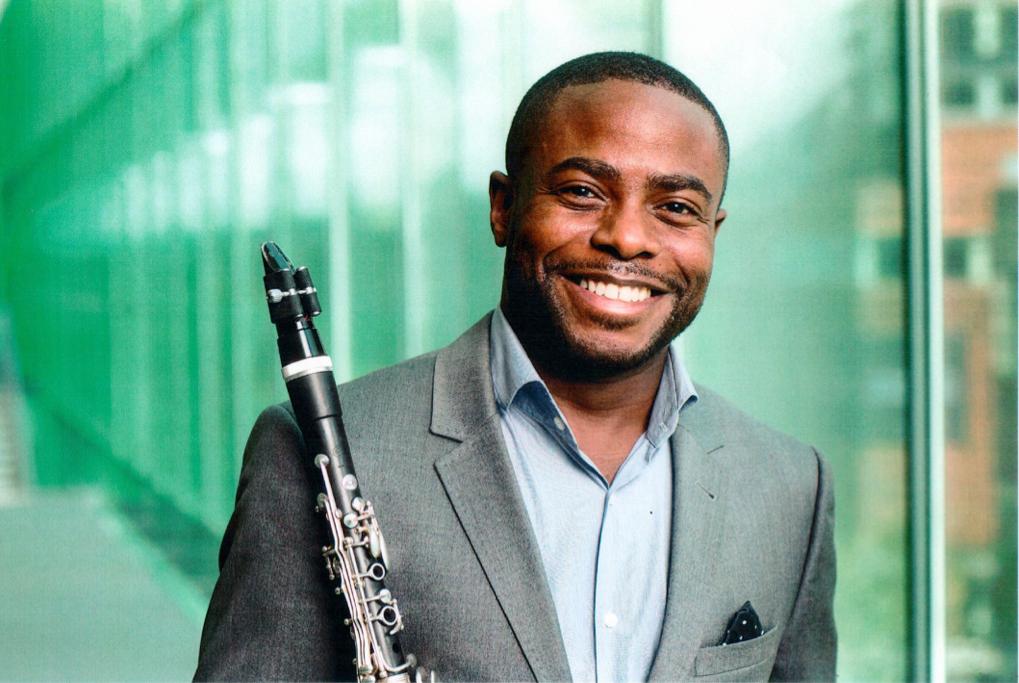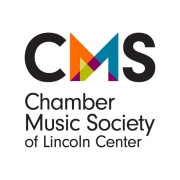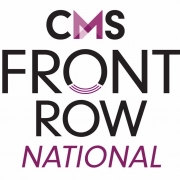Streaming on demand
Thurs., February 11th – Thurs., February 18th
Reservations for this past event are closed. Thank you to all who joined us!
Clarinetist Anthony McGill and a thrilling lineup of musicians come together for this streaming virtual concert on demand, in partnership with Lincoln Center’s Chamber Music Society Front Row: National program.
Mr McGill has been hailed by the New York Times for his “trademark brilliance, penetrating sound and rich character”. Enjoying a dynamic international solo and chamber music career, he is currently the principal clarinetist of the New York Philharmonic — the first African-American principal player in the organization’s history.
The Program
Introductions
Olivier Messiaen (1908-1992)
“Abyss of the Birds” from Quatuor pour la fin du temps (Quartet for the End of Time) for Clarinet, Violin, Cello, and Piano (1940-41)
Featuring: Anthony McGill, clarinet
Francis Poulenc (1899-1963)
Sonata for Clarinet and Piano (1962)
Allegro tristamente
Romanza: Très calme
Allegro con fuoco
Featuring: Anthony McGill, clarinet • Gloria Chien, piano
Intermission: Q&A with Anthony McGill, David Finckel & Wu Han
Johannes Brahms (1833-1897)
Trio in A minor for Clarinet, Cello, and Piano, Op. 114 (1891)
Allegro
Adagio
Andantino grazioso
Allegro
Featuring: Anthony McGill, clarinet • Alisa Weilerstein, cello • Inon Barnatan, piano
More information
“Abyss of the Birds” from Quatuor pour la fin du temps (Quartet for the End of Time) for Clarinet, Violin, Cello, and Piano (1940-41)
Olivier Messiaen (Avignon, 1908 – Paris, 1992)
“The abyss is Time with its sadness, its weariness. The birds are the opposite of Time; they are our desire for light, for stars, for rainbows, and for jubilant songs.” -Messiaen
Quartet for the End of Time had one of the most remarkable premieres of the 20th century. Messiaen served in the French army during World War II and was captured by the Germans at Verdun in June 1940. He was sent to Stalag VIII-A in Görlitz, Germany (today in Poland), where he was imprisoned during the winter of 1940-41. The prisoner-of-war camp was bitterly cold and food was in short supply, but Messiaen’s fame helped him greatly. A sympathetic guard provided him with the materials to compose this quartet and arranged the premiere on January 15, 1941 in a barely heated hall in front of a few hundred spellbound prisoners and guards. Messiaen said, “Never was I listened to with such rapt attention and comprehension.”
The instrumentation was determined by the musicians available—Messiaen himself played the piano alongside clarinetist Henri Akoka, violinist Jean Le Boulaire, and cellist Étienne Pasquier. The work’s movements are a mix of solos, duos, and trios, with only four of the eight movements using the full quartet. “Abyss of the Birds” was actually the first music Messiaen composed. He met the clarinetist Henri Akoka while serving at Verdun and began a piece for him based on the birdsongs that he heard at the end of his night watch. They were captured before Akoka could try the piece, and the clarinetist first played it in an open field in Nancy, where they were held while waiting to be transported to the prisoner-of-war camp. Messiaen’s sprightly birdsongs are surrounded by meter-less, meditative reveries.
Messiaen was freed and allowed to return to Paris just a month after the January 1941 premiere of the full quartet. Akoka, who was Jewish, was not so lucky but he made his way out of captivity in a daring escape. He was briefly transferred from Germany to western France, and on the ride back to the prisoner-of-war camp he jumped from the top of the train in the middle of the night. He lay injured and unconscious by the tracks and luckily was found by railway workers and taken to the home of a sympathetic doctor who hid him for over a month while he recovered. He reached the French Free Zone on May 17, 1941. (For the full story of Messiaen, Akoka, and the quartet see For the End of Time: The Story of the Messiaen Quartet by Rebecca Rischin.)
Sonata for Clarinet and Piano (1962)
Francis Poulenc (Paris, 1899 – Paris, 1963)
The Clarinet Sonata was one of Poulenc’s last works. Its style is out of step with the avant-garde 1960s and it doesn’t reflect his (relatively) advanced age, rather it hearkens back to his beginnings. He launched his career in the heady atmosphere of post-World War I Europe and embraced the spirit of novelty and experimentation that was so popular at the time. He created his own sound inspired by café music—cheeky, irreverent, and slightly absurd. It wasn’t like anyone else. He said, “I am not a cubist musician, even less a futurist, and of course, not an Impressionist. I am a musician without a label.” To create his unique sound he used winds. After exploring unusual combinations of winds in his earlier years in pieces like the sonatas for two clarinets and for clarinet and bassoon, he returned to more traditional pairings for his late flute sonata, clarinet sonata, and oboe sonata, each with piano. French musicologist Claude Rostand famously described Poulenc as part monk, part troublemaker and the droll, insouciant sound of winds suited him perfectly.
Poulenc wrote his Clarinet Sonata for Benny Goodman. Though known as a jazz clarinetist, Goodman had a strong interest in classical music and commissioned and premiered many works in the mid-20th century: Bartók’s Contrasts, Gould’s Derivations, and concertos by Copland, Hindemith, and Milhaud. Poulenc was supposed to play the piano at the premiere but he passed away from a sudden heart attack on January 30, 1963 and Leonard Bernstein joined Goodman for the premiere on April 10, 1963 at Carnegie Hall.
Trio in A minor for Clarinet, Cello, and Piano, Op. 114 (1891)
Johannes Brahms (Hamburg, 1833 – Vienna, 1897)
Brahms met clarinetist Richard Mühlfeld in March 1891 on a visit to Meiningen, where the clarinetist played in the court orchestra. Brahms had recently declared himself retired but his fondness of Mühlfeld’s playing inspired him to compose again. He wrote this trio and a clarinet quintet in summer 1891 and Mühlfeld premiered them before the end of the year in Berlin with Brahms at the piano. Three years later Brahms wrote two sonatas for Mühlfeld and again accompanied him on the piano. He liked Mühlfeld, calling him Fräulein Klarinette and Dear Nightingale, and treated him very well, giving him the manuscript scores for the sonatas and allowing him to have the full fees from their joint performances.
Though Brahms’ focus on the clarinet was new, the trio looks back. Brahms knew it was probably one of his last pieces, and it is a work of memory, of wistful longing for a lost past. The deep, dark-hued cello and the clear, bright clarinet are not natural companions but in the first movement they co-exist by echoing each other in long phrases. The effect of hearing two similar phrases in two different sound worlds is like hearing a story from different points of view. Every time the clarinet enters over the cello there’s a subtle twist in the plot, a new way of understanding the narrative. It’s a reminder that the past is ephemeral but we hold on to the faded memories of once strong emotions. The movement ends with running arpeggios in contrary motion—both instruments moving quickly but collectively not going anywhere. The acceptance at the end is sweet but inevitable. The two middle movements are similarly bittersweet. The energy picks up a bit in the last movement for a satisfying conclusion to this late retrospective work.
Program notes by Laura Keller, CMS Editorial Manager
© 2020 Chamber Music Society of Lincoln Center
About the Musicians
“One of the most admired pianists of his generation” (New York Times), Israeli pianist Inon Barnatan is celebrated for his poetic sensibility, musical intelligence, and consummate artistry. He inaugurated his tenure as Music Director of California’s La Jolla Music Society Summerfest in 2019. He is the recipient of both a 2009 Avery Fisher Career Grant and Lincoln Center’s 2015 Martin E. Segal Award, served as the inaugural artist-in-association of the New York Philharmonic, and is an alum of CMS’s Bowers Program. His recent concerto collaborations include those with the Los Angeles Philharmonic, the Chicago Symphony Orchestra, the Royal Stockholm Symphony, the New Jersey Symphony, and the Cincinnati Symphony. Last season he played Mendelssohn, Gershwin, and Schubert for his solo recital debut at Carnegie’s Zankel Hall. He reunited with his frequent recital partner, cellist Alisa Weilerstein, for tours on both sides of the Atlantic, including performances of Beethoven’s complete cello sonatas in San Francisco and other US cities. His latest album is Beethoven’s complete piano concertos, recorded with Alan Gilbert and London’s Academy of St. Martin in the Fields. Other recent releases include a live recording of Messiaen’s 90-minute masterpiece Des canyons aux étoiles (From the Canyons to the Stars) at the Santa Fe Chamber Music Festival and Schubert’s late piano sonatas on the Avie label, winning praise from such publications as Gramophone and BBC Music.
Taiwanese-born pianist Gloria Chien has a diverse musical life as a noted performer, concert presenter, and educator. She was selected by the Boston Globe as one of its Superior Pianists of the year. She made her orchestral debut at the age of 16 with the Boston Symphony Orchestra with Thomas Dausgaard, and performed again with the BSO with Keith Lockhart. In recent seasons she has performed as a recitalist and chamber musician at Alice Tully Hall, the Library of Congress, the Phillips Collection, the Kissinger Sommer festival, the Dresden Chamber Music Festival, and the National Concert Hall in Taiwan. She performs frequently with the Chamber Music Society of Lincoln Center and is an alum of CMS’s Bowers Program. In 2009 she launched String Theory, a chamber music series at the Hunter Museum of American Art in downtown Chattanooga that has become one of Tennessee’s premier classical music presenters. The following year she was appointed Director of the Chamber Music Institute at the Music@Menlo festival, a post she held for the next decade. In 2017, she joined her husband, violinist Soovin Kim, as Co-Artistic Director of the Lake Champlain Chamber Music Festival in Burlington, Vermont. The duo serve as the new Artistic Directors at Chamber Music Northwest in Portland, OR. Ms. Chien received her bachelor’s, master’s, and doctoral degrees from the New England Conservatory of Music as a student of Russell Sherman and Wha-Kyung Byun. She is an artist-in-residence at Lee University in Cleveland, Tennessee and is a Steinway Artist.
Hailed for his “trademark brilliance, penetrating sound and rich character” (New York Times), clarinetist Anthony McGill enjoys a dynamic international solo and chamber music career and is principal clarinet of the New York Philharmonic—the first African-American principal player in the organization’s history. In 2020, he was awarded the Avery Fisher Prize, one of classical music’s most significant awards given in recognition of soloists who represent the highest level of musical excellence. He appears regularly as a soloist with top orchestras, including the New York Philharmonic, Metropolitan Opera, Baltimore Symphony Orchestra, San Diego Symphony, and Kansas City Symphony. He was honored to perform at the inauguration of President Barack Obama, premiering a piece by John Williams and performing alongside Itzhak Perlman, Yo-Yo Ma, and Gabriela Montero. As a chamber musician, he is a favorite collaborator of the Brentano, Daedalus, Guarneri, JACK, Miró, Pacifica, Shanghai, Takács, and Tokyo Quartets, as well as Emanuel Ax, Inon Barnatan, Gloria Chien, Yefim Bronfman, Gil Shaham, Midori, Mitsuko Uchida, and Lang Lang, and is an alum of CMS’s Bowers Program. In demand as a teacher, he serves on the faculty of The Juilliard School, Curtis Institute of Music, and Bard College Conservatory of Music. He is the Artistic Director for the Music Advancement Program at The Juilliard School. In May 2020, McGill launched #TakeTwoKnees, a viral musical protest video campaign against the death of George Floyd and historic racial injustice.
Alisa Weilerstein is one of the foremost cellists of our time. Since making her professional and Carnegie Hall debuts in her early teens, she has been in high demand as a solo recitalist, chamber musician, and concerto soloist with leading orchestras worldwide. She was recognized with a MacArthur Fellowship in 2011. An authority on Bach’s music for unaccompanied cello, she recently released a best-selling recording of his solo suites on the Pentatone label, streamed them in her innovative #36DaysOfBach project, and deconstructed his beloved G major prelude in a Vox video, viewed almost 1.5 million times. Her discography also includes chart-topping albums and a winner of BBC Music’s “Recording of the Year” award. As Artistic Partner of the Trondheim Soloists, she regularly tours and records with the Norwegian orchestra. She is an ardent advocate of contemporary music, and has premiered and championed important new works by composers including Pascal Dusapin, Osvaldo Golijov, and Matthias Pintscher. Other career milestones include a performance at the White House for President and Mrs. Obama. Diagnosed with type 1 diabetes at nine years old, Weilerstein is a staunch advocate for the T1D community. She lives with her husband, Venezuelan conductor Rafael Payare, and their young child.
Streaming Tips & Tricks
Helpful tips to enjoy the show:
- You can stream the concert from any device with a strong internet connection. Sound quality will vary depending on the speakers and device you are using. Some of the ways to get optimal sound quality include:
- Connect to Bluetooth speakers from your mobile phone or tablet
- Connect high quality speakers to a desktop or laptop computer
- Listen with headphones
(Hint: if you are viewing on a device which can receive messages/calls, we recommend you switch on “do not disturb” so you can enjoy the program without interruptions.)
- If your program doesn’t begin playing automatically, click the “play” icon located in the lower left corner of the video.
(Another good troubleshooting idea is to hit the “refresh” button on your web browser.)
- Click the full screen icon to the left of the CMS logo to get the best viewing experience:
- Can’t hear anything? Don’t forget to unmute/turn up the volume on your device!
- To stream the video to your home TV:
If you are an Apple user, you can use AirPlay or screen mirroring to display the video from your iPhone, iPad, or iMac to your Apple TV (or other smart TV with AirPlay capability).
You can also achieve this using an HDMI cable to send the signal from your laptop to your TV.
- Need a break? You can pause the performance, but if you close out of the browser window, you will lose your place in the video, so make sure to note the time you are stopping if you are not returning right away and want to resume from where you left off.





